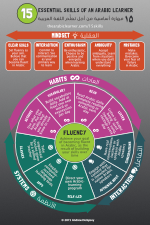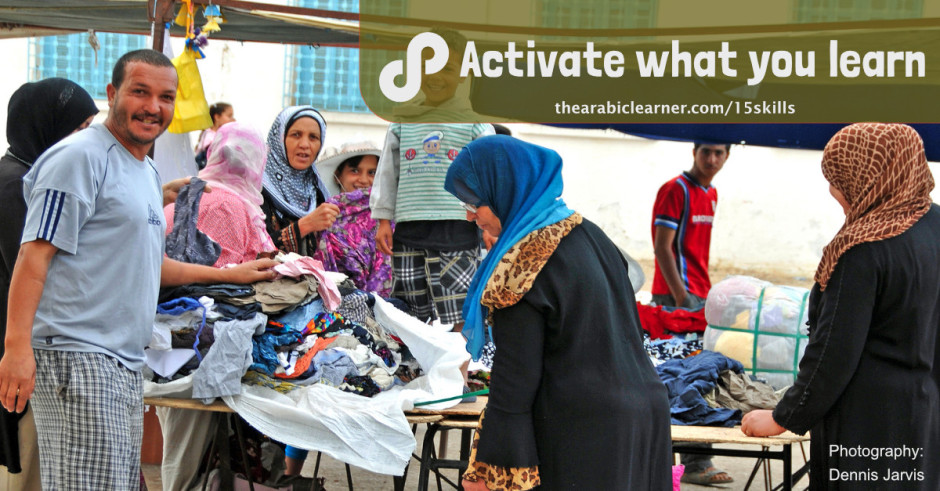 Use what you have already learned in Arabic immediately. One of the dangers that some people fall into is growing in their knowledge of vocabulary, grammar, or pronunciation, but never taking initiative to actually use it in real life. If you make a daily habit of using your Arabic in some small way, you will have broken the inertia of passive learning and will be actively increasing your Arabic level.
Use what you have already learned in Arabic immediately. One of the dangers that some people fall into is growing in their knowledge of vocabulary, grammar, or pronunciation, but never taking initiative to actually use it in real life. If you make a daily habit of using your Arabic in some small way, you will have broken the inertia of passive learning and will be actively increasing your Arabic level.
“To keep [Arabic] in your head, you have to use it.” (David Wilmsen)
This article is based on the 15 Essential Skills of an Arabic Learner.
Habits for learning Arabic
What habits do you have that are helping you learn Arabic? What habits do you wish you had?
 Aristotle said, about habits, “We are what we repeatedly do. Excellence, then, is not an act, but a habit”.
Aristotle said, about habits, “We are what we repeatedly do. Excellence, then, is not an act, but a habit”.
This week, I’ll begin to discuss some of the daily habits that make up a solid Arabic learning strategy. With the right mindsets in place, choosing what you will repeatedly do will form habits of excellence in you as an Arabic learner.
Over the past weeks I have discussed the five key mindsets that are essential skills of an Arabic learner. These include setting fluency as your aim, committing to interact, being enthusiastic, accepting ambiguity, and making mistakes. I call them skills because they are mindsets that are intentionally developed through conscious effort, not gifts that are endowed on random people. Each of these mindsets came up repeatedly as I discussed learning Arabic with 6 thought-leaders in the field of teaching Arabic. If you develop these mindsets, you will be positioned to learn Arabic effectively.
What I am trying to do with this applied research and discussion is to help you form a learning strategy for acquiring Arabic. If you have not yet read the overall strategy given in The 15 Essential Skills of an Arabic Learner, I recommend that you download that now and skim through it. Then come back to this post.
The first habit is to activate the Arabic you learn by using it daily. This post is going to give you 21 ideas that you can put into action today to begin to use your Arabic.
Breaking the cycle of passive learning
We’ve all heard of “professional students”… those who attend university and seem to take a never-ending progression of undergraduate, graduate, and post-graduate programs. They keep getting degrees but never fully graduate, and never launch into a place where they have to apply their knowledge. Some of them go on to teach other professional students.
I am not talking about people who have to put in long, focused years of academic effort to reach a goal. That kind of person demonstrates an admirable ability to focus on long term goals and to put in the hard work required to reach their objective. If that’s you, keep it up. I am talking about the person who wanders through life “learning”, but never putting anything into action.
When it comes to Arabic, I’ve watched a good number of people learn without ever activating or using the skills they develop. Our goal as Arabic learners is to cultivate a habit of using the Arabic we have already learned in some way each day. This is how you can break the inertia of passive learning, and grow your Arabic language over time.
24 Activities
Here is a ready-to-use list of 24 activities to get you using your Arabic today. I have tried to vary them between activities involving listening, speaking, reading, and writing, and between activities that require you being in physical proximity with Arabic speakers, versus from a distance. Some of them are suitable for beginners, others for intermediate or advanced levels. Choose one of them, and put it into action right away!
1. Skype conversation
Get in a skype conversation with an Arabic speaker. You can do this very easily through online language exchange websites such as italki, mylanguageexchange.com, interpals.net, easylanguageexchange.com, and others. Go to the website, sign up, and set up a conversation with an Arabic speaker. It’s pretty easy. It often takes a few different tries to find a language partner that works well with you. Don’t let that stop you from having your first conversation!
2. Listen to a podcast
Listen to an Arabic language podcast produced for Arabic speakers and try to understand as much as you can, even if it’s bits and pieces. If it is a long podcast and you find it hard to concentrate for that length of time, set a timer and listen for five minutes. Glean as much as you can. Write down one or more words that you do not understand and look them up. You can find a list of some useful Arabic podcasts here.
3. Interact with Arabic YouTube
Watch some video footage on YouTube in Arabic. Write a comment on it in the comment section (preferably in Arabic, but could also write in English). If you are not sure how to find useful videos, here’s one way you can use. Go to Google Translate and get an Arabic translation of any subject you are interested in. Copy and paste that translation into the YouTube search field.
4. Read the News
Find an interesting news article in Arabic, and take time to read through it. Start by skimming it quickly as a whole, then work your way through it in whatever detail you have time for. Rather than looking up every word you do not understand, locate one or two key words in your initial skim, and look them up. To find good news articles, you can go to Google News, and look for the setting that allows you to change your edition (it is usually by default be set to your country). Change that to “العالم العربي”, and you will find your page full of news. You can then search for specific subjects (you can even search in English and get Arabic results).
5. Watch the News
This is essentially the same as the item above, but rather than read the news you will watch it. Instead of Google News, use YouTube (most news channels post video on YouTube). You could search for “today’s news” (أخبار اليوم) or any topic of your choice.
6. Twitter
Go to twitter.com, and type a search term in Arabic into the search field (see notes in item 3 above for how to translate a search term). Remember that twitter has a character limit of 140 characters, so the Arabic you read here is brief and not always grammatically correct. It is real communication by Arabic speakers, done briefly. Choose a number of Arabic tweets to read. Try replying to one in Arabic, or tweet something in Arabic using a hashtag that you find interesting.
7. Reddit
Search for a subject in Arabic on reddit.com, and find a discussion that has lots of replies. Reddit is different from twitter in that it tends to have more in-depth discussions (although it will vary from subject to subject). Activities you could do this this include reading the entire thread (could take a while), translating it, or responding to it.
8. Facebook
Facebook is one of the most widely-used communication tools in the Arab world for opinions, events, news, business, etc. Find a post using a defined search term, and choose a useful activity for your purposes, similar to what is suggested above for reddit.com. Read a long thread, summarize it, translate it, comment on it, or ask a question.
9. Serve
Volunteer time for a charity or public service in which you have opportunity to use Arabic. If you live in an Arab country, ask around to find out what charities offer opportunities like this. I have seen this used successfully here in Egypt with Islamic and Christian charities. In other countries, opportunities to work with refugees are increasing. International student groups are possible avenues to serve on college campuses. This one takes a bit more work and time invested, but may give some of the richest opportunities.
10. Read a book
For intermediate and advanced Arabic learners, read a book in Arabic. Read a chapter or several pages each day. Try the Popular Arabic Books to Read Shelf on goodreads.com, or read/listen to books on alwaraq.net (for example, 1001 nights).
11. Religious service
Find and attend an Arabic religious service in your area. If you live in the Arab world, this should be a simple matter of attending a local mosque or church. Outside of the Arab world, you should be able to find mosques or Arabic churches in your area by searching on the web. Most religious establishments will welcome newcomers and help familiarize them with what is happening, if you would like.
12. Religious reading
Daily reading of religious texts is something that is very common in the Arab world. If you have a religious interest, one way that you can get daily practice in reading and/or speaking is to read or listen to the religious text of your choice each day. Reading the Quran or the Bible online is easy, or you can search for other texts of your choice.
13. Write something
Commit to writing something in Arabic each day. It may be a sentence, or a paragraph, or a journal entry, depending on your level of skill. You may find it helpful to get a notebook that is dedicated to your writing, or write on your computer (learn to type in Arabic if you don’t yet know how). It is fun to look back at what you have written earlier.
14. Record something
Similar to writing, but instead of using a pen and a book, use a microphone. Make an audio or video recording of yourself speaking, reading, reciting, or interacting in Arabic. Save your files in places you can review them in the future. Share them with others if you are comfortable.
15. Label a room
This can be fun for beginners. Use a dictionary (online or offline) and write out labels, in Arabic, for all of the items in one room of your house. Stick the labels on the items (chairs, tables, bookshelves, lights, etc.) and practice saying the word each time you see the label.
15. Create a song
You can do this on two levels. If you are capable, write out an original song in Arabic. If that’s a bit difficult, you can translate a favorite song from your first language into Arabic. Try to write it in Arabic using words that fit the tune. It can be funny. If you are successful, record yourself and share it.
16. Make a file of recipes
Start with a favorite recipe that you like, and create a card/document in which you translate the recipe into Arabic. Translate one recipe per day for a set period of time, and soon you will have a week or a month’s worth of recipes, and be well on your way to a cookbook! If you know someone who speaks Arabic, get their feedback on it. Ask them if they would be able to successfully cook/bake the thing intended by your recipe.
17. Tour
If you live in the Arab world, take a tour of a place in your city or country that you have not visited yet. Find a guide who will give you the tour in Arabic. This is a great way to interact, ask questions, and listen, as well as have fun. If you do not live in the Arab world, try to find an Arabic speaker who can take 30 minutes and meet you to give you a tour in Arabic of any specific location. Treat them to a coffee (or tea) to wrap up the tour.
18. Ask for help
This can be done by anyone, anywhere. Think of an area in your life in which you need help – whether something small and practical, or big and monumental. Try to find an Arabic speaker to help you with it. If you have access to recently immigrated Arabs or refugees, this can be a great way to make friends. If you do not live near anyone who speaks Arabic, you can often find help/advice in online forums.
19. Shop
Go shopping in Arabic. If you live in the Arab world, this can be as simple as shopping for your everyday needs, although you may want to challenge yourself with finding something rare or special in a market (as opposed to a mall). If you live in a city outside of the Arab world, you may be able to find an area or even a single shop in which Arabic is spoken. You might need to explain to them in English that you are learning Arabic and ask if they would be willing to interact with you in Arabic as you buy your things.
20. Fix something
This activity is also primarily for those who live in the Arab world. Find something that is not working in your house, and have someone come to fix it. If it is portable, you can take it to be fixed. This is a good opportunity to use Arabic in a practical way.
21. Visit someone
A simple concept that is easily forgotten in the age of social media. Visit someone who speaks Arabic, and talk with them. Or go out for coffee/tea. Be social… in the traditional meaning of the word. If you are a heritage learner (someone with an Arab or Muslim background), it may be as simple as taking time to visit your grandmother. Which is just a good thing to do anyway.
22. Watch a film
Watch a film in the cinema in Arabic, if you live in a place where that is possible. There’s nothing like being part of a crowd watching something together. If you don’t have access to that, try a website like watcharabicmovie.net.
23. Create a bookmark list
As an Arabic learner, you have probably come up with a list of web resources that you use and appreciate. Make a resources list or bookmark list based on the things that you find most helpful. Annotate it in Arabic and/or English (or any other language).
24. Make an instructional video
What is a unique gift or skill that you have? Plan and film a short instructional video (1-5 minutes) on how to do it. Share it on YouTube… it might go viral!
Help me add to my list. What are some ideas that you use for activating your Arabic? Leave a comment below, or drop me an email.


 RSS - Posts
RSS - Posts
Thank you v much. This is so good that I am bookmarking it.
I find Twitter and Facebook and other social media rather daunting so I avoid them. But I shall go for as many of your other ideas as I have the energy for. Don’t know what a podcast is, but will look into it. I get a couple of Arabic newspapers every day and try to understand the Page 1 stories. And you now have me wondering how the Yorkshire county anthem, “Ilkley Moor,” would sound in Arabic!
The Gallimard bilingual series for English and French, with pages in English faced by their equivalent in French, is a brilliant idea for learning French. You don’t have to keep laboriously consulting a dictionary. Unfortunately there isn’t an equivalent for English and Arabic. But I am currently reading a book called, “Taxi,” by Khaled Khameesy in consort with an excellent translation by Jonathan Wright.
The Arabic original is publishd by Dar El Shurooq, the English by Aflame Books, UK. The book consists of a series of short conversations with Cairo taxi drivers about life here as the author travels about the town on various errands. I do recommend it.
Glad you liked the post, Ramez! Now that we’re past the mindset stuff, they will be getting a bit more practically oriented.
I think your use of the daily newspaper is great. I would stick with that! No need for social media. 🙂 And I will keep my eye open for the Taxi original in Arabic next time I drop by Dar El Shurooq. Might warrant a trip to City Stars (although I’m not sure if I’m that desperate or not).
The bilingual series sounds interesting. It’s interesting that the place I have seen that easily available in Arabic/English is in religious books. I have seen both the Qur’an and the Bible in a similar setup – English on the left page, Arabic on the right. So if reading either of those has any interest to you, it’s an easy way to get started – you’ll find bookshops that serve up either in different parts of Cairo. If you’re interested in more everyday Arabic, I’d start with the Bible… not to be sectarian or anything, but the level of Arabic is much easier! If your interest is more classical, go for the Qur’an.